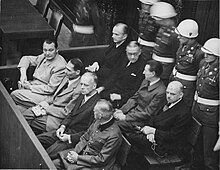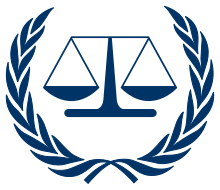International criminal law
As international criminal law , the sum of is legal standards referred to which the criminal liability of individuals directly on the basis of international law justified. International law crimes are genocide , war crimes , crimes against humanity and the crime of aggression . In the case of these crimes, it is assumed that their effects go beyond a single state and that the international community as a whole has an interest in prosecuting those responsible.
At the same time, national criminal law and the national judiciary often prove to be inadequate in these cases. Since international law crimes are usually committed or at least supported by members of a state apparatus, they can often exert considerable influence on national criminal prosecution. The following therefrom impunity (English: impunity ) the offender is a violation of the universally applicable according to current understanding Human Rights considered the victims. The development of international criminal law is therefore closely related to the development of human rights. While human rights entitle individuals, international criminal law regulates the obligations of individuals. International criminal law is - like criminal law in general - the strictest means ( ultima ratio ) and only applies to serious human rights violations.
International criminal law represents a decisive change in two fundamental principles of classical international law. By directly obliging individuals, it represents, on the one hand, a change in the traditional understanding of international law, according to which only states are subjects of international law . On the other hand, the principle of state sovereignty is restricted, since serious human rights violations are no longer viewed as internal affairs of a state, but can be prosecuted internationally.
In addition to the substantive requirements that determine criminal liability in detail, the associated procedural law is also part of international criminal law. This includes, for example, regulations on the procedure before international criminal courts. Today the most important institution for the enforcement of international criminal law is the International Criminal Court .
history

Historically, ideas for creating an international criminal justice system have existed for a long time, but it was not until the 20th century that they took on concrete form. After the First World War, the Versailles Treaty provided for the German Emperor Wilhelm II to be charged with international crimes. However, due to the refusal of the Netherlands to extradite Wilhelm II, this did not happen ( see also: Leipzig Trials ).
The hour of birth of international criminal law was the Nuremberg trial of the main war criminals in 1945/1946. Under the impression of the German wars of annihilation in Europe during the Second World War and the large-scale state-organized crimes in the time of National Socialism , the London Statute was the first to create a treaty under international law, which codified criminal norms of international law that were partially unwritten and codified the criminal liability of individuals directly under international law codified. The International Military Tribunal for the Far East had a function corresponding to the International Military Tribunal in Nuremberg . These processes, as well as the 12 Nuremberg successor processes carried out on the basis of the Control Council Act No. 10 , are still important today for determining the scope of international criminal law under customary international law ( see below: Legal Sources ).
During the Cold War, the development of international criminal law largely stagnated. The legal principles of the Nuremberg Trials were confirmed by several resolutions of the UN General Assembly. The UN International Law Commission summarized these in the so-called “ Nuremberg Principles ” and published several drafts for a codification of international criminal law. However, there was no actual prosecution of international law crimes by international criminal courts.
This only changed in 1993 with the creation of the International Criminal Court for the Former Yugoslavia (also known as the Yugoslavia Tribunal or ICTY) and the International Criminal Court for Rwanda (also known as the Rwanda Tribunal or ICTR) in 1995. These Ad -hoc tribunals are temporally and spatially limited in their jurisdiction to international law crimes in the course of the Yugoslav wars since 1991 and the genocide in Rwanda in 1994. Due to their case law, both ad hoc criminal courts have a number of fundamental decisions essential for further development and clarification of international criminal law.
The creation of the International Criminal Court with its seat in The Hague through the Rome Statute of July 17, 1998 was the provisional high point in the development of international criminal law . After the deposit of the 60th instrument of ratification, the Court of Justice began its work on July 1, 2002. For the first time in history, there is a permanent international court to prosecute the most serious human rights violations. The Rome Statute is currently signed by 139 states and ratified by 123 states . On March 14, 2012, the ICC passed its first judgment in the trial of Thomas Lubanga .
In order to implement the requirements of the Rome Statute, many states have adopted international criminal law provisions in their national criminal laws. In Germany this happened in 2002 when the International Criminal Code came into force . In September 2015, the FDLR process, the first procedure under the International Criminal Code, was concluded in the first instance before the 5th criminal senate of the OLG Stuttgart . After more than four years of trial, Ignace Murwanashyaka and Straton Musoni were sentenced to 13 and 8 years in prison for promoting human rights crimes in Rwanda.
Another new development in international criminal law is the creation of so-called hybrid courts in Sierra Leone and Cambodia . The legal successor to the ad hoc tribunals for the former Yugoslavia and Rwanda is the international residual mechanism for the ad hoc criminal courts .
Legal sources
International criminal law is a branch of international law . It is therefore based on the same legal sources: international treaty law , customary international law and general legal principles ( cf. Art. 38 I lit a, b, c ICJ Statute). The most important source of international law is the Rome Statute of the International Criminal Court .
The German International Criminal Code (like comparable regulations in other countries) is a national law and not a legal source under international law. According to the justification of the law, it should reflect the state of international criminal law.
Criminal offenses
Crimes under international law are “the most serious crimes that affect the international community as a whole ” (cf. Paragraph 4 of the preamble to the ICC Statute ). The core crimes include:
- the genocide
- the crimes against humanity ,
- the war crimes and
- the crime of aggression (war of aggression).
All four core crimes have in common that the individual acts listed (e.g. killing of a person) must always take place in a specific overall context of organized violence (so-called context element ) in order to be able to qualify the act as a whole as a crime under international law. This is a consequence of the aim of international criminal law to prosecute macro- crime (usually state-organized crimes). The context element for war crimes is armed conflict , for crimes against humanity the widespread or systematic attack against the civilian population , for genocide the (intent to) destroy a certain group and for crimes of aggression the state act of aggression .
Competent courts

International criminal law is used by national courts, international courts and, more recently, mixed forms of both (so-called hybrid courts).
International criminal law proceedings by national courts were historically z. B. the Nuremberg follow- up trials or the proceedings against Adolf Eichmann before the Jerusalem district court and are currently about criminal proceedings before German courts under the International Criminal Code . The international law principle applies here : Since international law crimes are directed against internationally protected legal interests, every state is in principle also entitled to punish acts in other states without there having to be a specific reference to this act.
The international courts include the International Military Tribunal , the Yugoslavia and Rwanda Tribunals and, first and foremost, the International Criminal Court . Regarding the relationship between the International Criminal Court and the national courts, it should be noted in particular that the ICC only has subordinate jurisdiction if the actually competent state is either unwilling or unable to prosecute international law crimes (principle of complementarity, cf. Art. 17 ICC statute).
Hybrid criminal courts are based on both national and international legal bases and are composed of national and international judges. These include, for example, the Special Court for Sierra Leone or the Khmer Rouge Tribunal .
literature
- Gerhard Werle (Ed.): Völkerstrafrecht , 3rd edition, 2012, ISBN 978-3-16-151837-9 .
- Hans-Heiner Kühne , Robert Esser , Marc Gerding: International Criminal Law. 12 articles on international criminal law and international criminal law , Julius Jonscher Verlag Osnabrück 2007, ISBN 3-9811399-1-7 .
- Gerd Hankel , Gerhard Stuby (editor): Criminal courts against crimes against humanity. On international criminal law 50 years after the Nuremberg trials. 1995, ISBN 3-930908-10-7 .
- Antonio Cassese (Ed.): International Criminal Law , 3rd Edition, 2013, ISBN 0-19-969492-3 .
- M. Cherif Bassiouni (Ed.): Introduction to International Criminal Law , 2nd edition, 2012, ISBN 90-04-18644-1 .
- Wolfgang Kaleck : With double standards. The West and international criminal law. Berlin: Wagenbach 2012
Web links
- Database of international criminal law ( Legal Tools project of the International Criminal Court)
Individual evidence
- ↑ Resolution of the UN Security Council No. 827 of May 25, 1993
- ↑ Resolution of the UN Security Council No. 955 of November 8, 1994 (PDF; 48 kB)
- ↑ IStGH website ( Memento of the original from March 23, 2013 in the Internet Archive ) Info: The archive link was inserted automatically and has not yet been checked. Please check the original and archive link according to the instructions and then remove this notice. , accessed February 27, 2015.
- ↑ Documentation of the FDLR process of the taz
- ↑ Long prison sentences for FDLR militia leaders. In: Legal Tribune Online , September 28, 2015; Comment from the defense attorney's point of view. In: Legal Tribune Online , September 28, 2015.
- ↑ Justification of the law, BT-Drucks. 14/8524 (PDF; 688 kB).
- ^ Gerhard Werle : Völkerstrafrecht , 3rd edition, Tübingen 2012, Rn. 403
